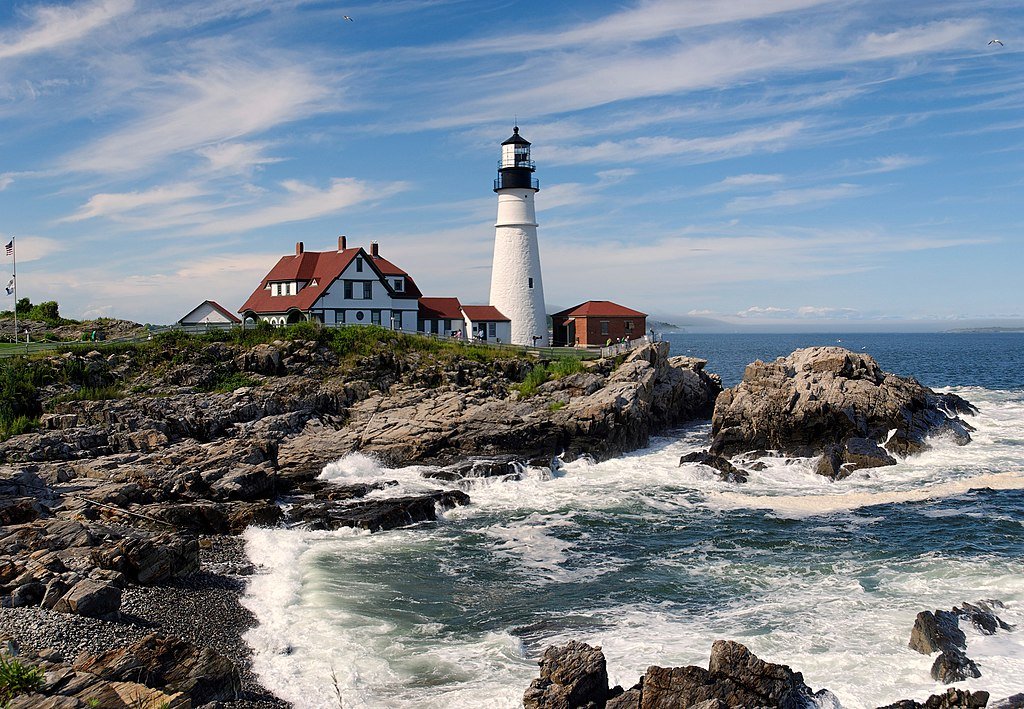8 April 2022
Maine is the northern- and easternmost US state on the eastern seaboard. It is the traditional land of a number of indigenous peoples, including the Passamaquoddy, Maliseet, Penobscot, Abenaki, Androscoggin, and Kennebec. Additionally, Micmac people migrated into the region after European contact. Indigenous peoples still dwell on the land, and the federally recognized tribes are the Aroostook Band of Micmac Indians, the Houlton Band of Maliseet Indians, the Passamaquoddy Tribe, and the Penobscot Nation. Collectively these peoples are known as the Wabanaki (People of the Dawnland).
The name Maine is of uncertain origin, but there are two primary hypotheses. The first is that was so named by French settlers to Acadia in 1604 after the province in France, which in turn is named for the Mayenne River. The second hypothesis is that Maine is a reference to the mainland, as opposed to islands, initially called that by English fishermen prior to English colonization.
The English colony dates to 1622, and the land was fought over by the English and French until 1740, when it fell under British control for good. Governance of the territory was split between New York and Massachusetts, becoming solely part of Massachusetts in 1691. Maine became the twenty-third state in 1820 in exchange for admitting Missouri into the union as a slave state.
The name Maine appears in the 10 August 1622 grant of the land to Fernando Gorges and John Mason by King James I of England (James VI of Scotland):
Now this indenture witnesseth, that ye said President and council, of their full, free and mutual consent, as well to the end that all the lands, woods, lakes, rivers, waters, islands and fishings, with all other the traffics, profits and commodities whatever to them or any of them belonging, and hereafter in these presents menconed may be wholly and entirely invested, appropriated, severed and settled in and upon ye said Ferdinando Gorges and Capt. John Mason, their heyers and assignee forever [...] the said Sr. Ferdinando Gorges and Capt. John Mason, with the consent of ye President and Councill, intend to name to name The Province of Maine.
Another early use of Maine to refer to the land is from 1624 by Christopher Levett, who attempted to establish a colony near what is now Cape Elizabeth. The colony would fail, but Levett’s record of the name lends credence to the idea that the name Maine stems from mainland:
And now in its place I come to Quack, which I haue named Yorke. At this place there fished divers ships of Waymouth this yeare.
It lyeth about two leagues to the East of Cape Elizabeth, it is a Bay or Sound betwixt the Maine and certaine Ilands which lyeth in the sea about one English mile and halfe.
Sources:
Everett-Heath, John. Concise Oxford Dictionary of World Place Names, sixth ed. Oxford: Oxford UP, 2020. Oxfordreference.com.
“Federal and State Recognized Tribes.” National Conference of State Legislatures, March 2020.
A Grant of the Province of Maine to Sir Ferdinando Gorges and John Mason (10 August 1622). The Avalon Project, Lillian Goldman Law Library, Yale Law School.
Levett, Christopher. A Voyage into New England. London: William Jones, 21 August 1624, 7. Early English Books Online (EEBO).
Oxford English Dictionary, third edition, June 2000, s.v. Maine, n.2
Photo credit: Anonymous photographer, 2009. Licensed under a Creative Commons Attribution 3.0 Unported license.

